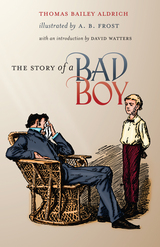4 books about Donawerth, Jane
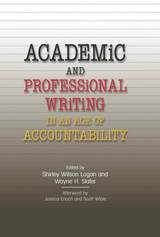
Academic and Professional Writing in an Age of Accountability
Edited by Shirley Wilson Logan and Wayne H. Slater, with an Afterword by Jessica Enoch and Scott Wible
Southern Illinois University Press, 2018
What current theoretical frameworks inform academic and professional writing? What does research tell us about the effectiveness of academic and professional writing programs? What do we know about existing best practices? What are the current guidelines and procedures in evaluating a program’s effectiveness? What are the possibilities in regard to future research and changes to best practices in these programs in an age of accountability? Editors Shirley Wilson Logan and Wayne H. Slater bring together leading scholars in rhetoric and composition to consider the history, trends, and future of academic and professional writing in higher education through the lens of these five central questions.
The first two essays in the book provide a history of the academic and professional writing program at the University of Maryland. Subsequent essays explore successes and challenges in the establishment and development of writing programs at four other major institutions, identify the features of language that facilitate academic and professional communication, look at the ways digital practices in academic and professional writing have shaped how writers compose and respond to texts, and examine the role of assessment in curriculum and pedagogy. An afterword by distinguished rhetoric and composition scholars Jessica Enoch and Scott Wible offers perspectives on the future of academic and professional writing.
This collection takes stock of the historical, rhetorical, linguistic, digital, and evaluative aspects of the teaching of writing in higher education. Among the critical issues addressed are how university writing programs were first established and what early challenges they faced, where writing programs were housed and who administered them, how the language backgrounds of composition students inform the way writing is taught, the ways in which current writing technologies create new digital environments, and how student learning and programmatic outcomes should be assessed.
The first two essays in the book provide a history of the academic and professional writing program at the University of Maryland. Subsequent essays explore successes and challenges in the establishment and development of writing programs at four other major institutions, identify the features of language that facilitate academic and professional communication, look at the ways digital practices in academic and professional writing have shaped how writers compose and respond to texts, and examine the role of assessment in curriculum and pedagogy. An afterword by distinguished rhetoric and composition scholars Jessica Enoch and Scott Wible offers perspectives on the future of academic and professional writing.
This collection takes stock of the historical, rhetorical, linguistic, digital, and evaluative aspects of the teaching of writing in higher education. Among the critical issues addressed are how university writing programs were first established and what early challenges they faced, where writing programs were housed and who administered them, how the language backgrounds of composition students inform the way writing is taught, the ways in which current writing technologies create new digital environments, and how student learning and programmatic outcomes should be assessed.
[more]
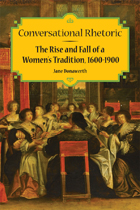
Conversational Rhetoric
The Rise and Fall of a Women's Tradition, 1600-1900
Jane Donawerth
Southern Illinois University Press, 2011
Much of the scholarly exchange regarding the history of women in rhetoric has emphasized women’s rhetorical practices. In Conversational Rhetoric: The Rise and Fall of a Women’s Tradition, 1600–1900, Jane Donawerth traces the historical development of rhetorical theory by women for women, studying the moments when women produced theory about the arts of communication in alternative genres—humanist treatises and dialogues, defenses of women’s preaching, conduct books, and elocution handbooks. She examines the relationship between communication and gender and between theory and pedagogy and argues that women constructed a theory of rhetoric based on conversation, not public speaking, as a model for all discourse.
Donawerth traces the development of women’s rhetorical theory through the voices of English and American women (and one much-translated French woman) over three centuries. She demonstrates how they cultivated theories of rhetoric centered on conversation that faded once women began writing composition textbooks for mixed-gender audiences in the latter part of the nineteenth century. She recovers and elucidates the importance of the theories in dialogues and defenses of women’s education by Bathsua Makin, Mary Astell, and Madeleine de Scudéry; in conduct books by Hannah More, Lydia Sigourney, and Eliza Farrar; in defenses of women’s preaching by Ellen Stewart, Lucretia Mott, Catherine Booth, and Frances Willard; and in elocution handbooks by Anna Morgan, Hallie Quinn Brown, Genevieve Stebbins, and Emily Bishop. In each genre, Donawerth explores facets of women’s rhetorical theory, such as the recognition of the gendered nature of communication in conduct books, the incorporation of the language of women’s rights in the defenses of women’s preaching, and the adaptation of sentimental culture to the cultivation of women’s bodies as tools of communication in elocution books.
Rather than a linear history, Conversational Rhetoric follows the starts, stops, and starting over in women’s rhetorical theory. It covers a broad range of women’s rhetorical theory in the Anglo-American world and places them in their social, rhetorical, and gendered historical contexts. This study adds women’s rhetorical theory to the rhetorical tradition, advances our understanding of women’s theories and their use of rhetoric, and offers a paradigm for analyzing the differences between men’s and women’s rhetoric from 1600 to 1900.
[more]
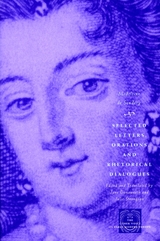
Selected Letters, Orations, and Rhetorical Dialogues
Madeleine de Scudery
University of Chicago Press, 2004
Madeleine de Scudéry (1607-1701) was the most popular novelist in her time, read in French in volume installments all over Europe and translated into English, German, Italian, and even Arabic. But she was also a charismatic figure in French salon culture, a woman who supported herself through her writing and defended women's education. She was the first woman to be honored by the French Academy, and she earned a pension from Louis XIV for her writing.
Selected Letters, Orations, and Rhetorical Dialogues is a careful selection of Scudéry's shorter writings, emphasizing her abilities as a rhetorical theorist, orator, essayist, and letter writer. It provides the first English translations of some of Scudéry's Amorous Letters, only recently identified as her work, as well as selections from her Famous Women, or Heroic Speeches, and her series of Conversations. The book will be of great interest to scholars of the history of rhetoric, French literature, and women's studies.
Selected Letters, Orations, and Rhetorical Dialogues is a careful selection of Scudéry's shorter writings, emphasizing her abilities as a rhetorical theorist, orator, essayist, and letter writer. It provides the first English translations of some of Scudéry's Amorous Letters, only recently identified as her work, as well as selections from her Famous Women, or Heroic Speeches, and her series of Conversations. The book will be of great interest to scholars of the history of rhetoric, French literature, and women's studies.
[more]
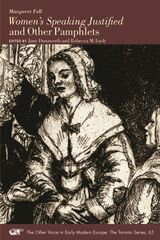
Women's Speaking Justified and Other Pamphlets
Margaret Fell
Iter Press, 2018
Margaret Fell (1614–1702), one of the co-founders of the Society of Friends and a religious activist, was a prolific writer and distributor of Quaker pamphlets. This volume offers eight texts that span her writing career and represent her range of writing: autobiography, epistle or public letter, examination or record of a trial, letter to the king, and argument for women’s preaching. These selections also document Fell’s contributions to Friends’ theology, exemplify seventeenth-century women’s English-language literacy, illustrate Fell’s theories of biblical reading, and exhibit the common qualities of Quaker rhetoric.
The Other Voice in Early Modern Europe - The Toronto Series, volume 65
The Other Voice in Early Modern Europe - The Toronto Series, volume 65
[more]
READERS
Browse our collection.
PUBLISHERS
See BiblioVault's publisher services.
STUDENT SERVICES
Files for college accessibility offices.
UChicago Accessibility Resources
home | accessibility | search | about | contact us
BiblioVault ® 2001 - 2024
The University of Chicago Press


